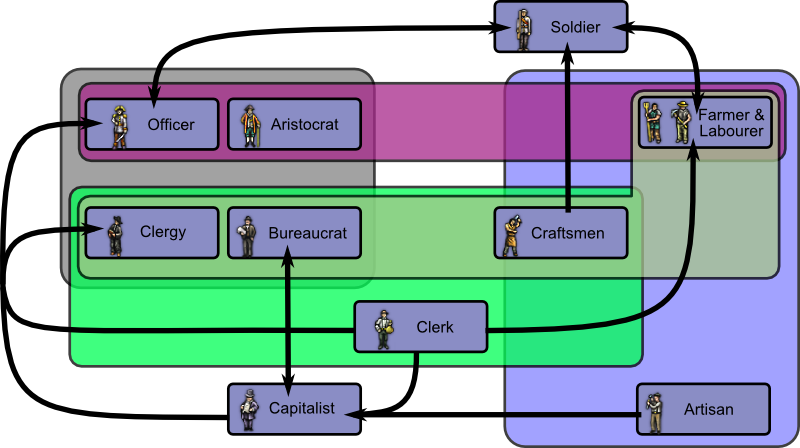人口从一个人群转化为另一个人群的过程称为升职或降职。
- 同一个框内的人群可以任意互相转化。
- 箭头表示人群可以以特定的方向转化。
POP Promotion and Demotion
All POPs promote and demote based on the same list of conditions. When a POP promotes, it changes to another POP type of the same economic stratum or higher. When a POP demotes, it changes to another POP type of the same economic strata or lower. For example, a clerk POP can promote to a capitalist POP or demote to a craftsman POP, or it can either promote or demote to a bureaucrat POP.
The Two Roll System
Promotion and demotion in Victoria 2 work on a two roll system, as do many of the other POP mechanics in the game. This is counter-intuitive at first, and requires some further explanation.
When a POP promotes or demotes, it first checks the tables in POPtypes.txt to decide if it is promoting (or demoting) at all. This is the Rate roll, as it determines the rate at which the POP is promoting. You can see the factors affecting this by hovering over the 'promotions' box in the POP detail screen. This alone decides the number of POPs who will change from one type to another.
Following the Rate roll, the POP will then roll on a weight table generated by its specific POP file. This is the Direction roll, as it determines which 'direction' the pop will promote - so it chooses between, say, Craftsmen and Farmers. This has no effect on the number of promoters, and the POP can only choose one direction per month - so you won't have 10 POPs becoming bureaucrats and 15 POPs becoming farmers from a single promotion batch. Promoting POPs will ignore all lower-strata POPs from this Direction roll, so a Clergyman will never promote to a farmer.
Demotion uses exactly the same two-roll system, except it rolls on the Demotion table in poptypes.txt to determine its Rate roll, and ignore all higher-strata POPs from its direction roll - so a Clergyman can never demote into an Aristocrat.
Summary of factors
- Higher literacy (each 10% increment) increases promotion and decreases demotion.
- High militancy (7-9) reduces promotion.
- Consciousness below 4 decreases demotion in poor strata only.
- Life needs:
- being met (above 70%-90%) increases promotion, especially in poor strata;
- not being met (below 70%-90%) increases demotion, especially in middle strata.
- Everyday needs being met (above 70%-90%) decreases demotion in middle strata only.
- Luxury needs not being met (below 80%-100%) increases demotion.
- Unemployment:
- above 10%-20% increases demotion;
- above 30% greatly increases demotion, unless the province is occupied.
- The following factors reduce both promotion and demotion:
- Pop is not of national religion
- Pop is not of national culture
- The state is a colony
- Slavery is legal in the country
- The state is a slave state
- Promotion and demotion won't happen at all if the province is occupied (-100% modifier for both).
Promotion factors
| Modifier | Factor |
|---|---|
| Base promotion rate | 0.25% |
| Literacy is at least 5% | +0.02% |
| Literacy is at least 10% | +0.02% per 10% literacy up to 90% |
| Militancy is at least 7 | −0.05% per point of militancy above 6 |
| Life needs at least 70% satisfied (poor only) | +0.10% cumulatively |
| Life needs at least 80% satisfied | +0.10% cumulatively |
| Life needs at least 90% satisfied | +0.10% cumulatively |
| Not national religion | −0.10% |
| Colonial state | −0.10% |
| Not national culture | −0.10% |
| Slavery is allowed | −0.10% |
| Slave state | −0.05% |
| Province occupied | −100.00% |
Demotion factors
| Modifier | Factor |
|---|---|
| Base demotion rate | 1.00% |
| Not national religion (poor only) | −0.10% |
| Colonial state (poor only) | −0.10% |
| ( |
−0.05% |
| Slavery is allowed | −0.10% |
| Slave state | −0.05% |
| Not national culture (poor only) | −0.10% |
| Literacy less than 90% | −0.02% per 10% literacy below 100% −0.02% additionally for literacy below 15% |
| Life needs less than 90% satisfied | +0.10% |
| Life needs less than 80% satisfied | +0.10% |
| Life needs less than 70% satisfied | +0.10% |
| Consciousness less than 4 (poor only) | −0.10% |
| Luxury needs less than 100% satisfied | +0.10% |
| Luxury needs less than 90% satisfied | +0.10% |
| Everyday needs at least 70% satisfied (middle only) | −0.10% |
| Everyday needs at least 80% satisfied (middle only) | −0.10% |
| Everyday needs at least 80% satisfied (middle only) | −0.10% |
| Life needs less than 30% satisfied (middle only) | +0.50% |
| Life needs less than 20% satisfied (middle only) | +0.50% |
| Life needs less than 10% satisfied (middle only) | +0.50% |
| Unemployment at least 10% | +0.10% |
| Unemployment at least 20% | +0.10% |
| Unemployment at least 30% and province is not occupied | +0.10% |
| Province is occupied | −100.0% |
References
- Download this PDF for a comprehensive overview of the game mechanics for POP promotion and demotion.
- Promotion charts
